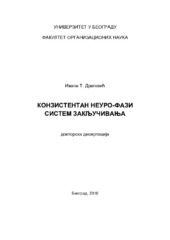Please use this identifier to cite or link to this item:
https://rfos.fon.bg.ac.rs/handle/123456789/95| Title: | Konzistentan neuro-fazi sistem zaključivanja A consistent neuro-fuzzy inference system |
Authors: | Dragović, Ivana | Contributors: | Petrović, Bratislav Suknović, Milija Radojević, Dragan |
Keywords: | neuronske mreže;neuro-fazi sistemi;konzistentna realno-vrednosna [0,1] logika;fazi sistem zaključivanja;fazi logika;neuro-fuzzy systems;neural networks;fuzzy logic;fuzzy inference systems;consistent real-valued [0,1] logic | Issue Date: | 2016 | Publisher: | Univerzitet u Beogradu, Fakultet organizacionih nauka | Abstract: | Veliki broj autora smatra da velike mogućnosti ekspertskih sistema leže u hibridnim modelima, što su ovi sistemi i dokazali u praksi. Motivisan time, predloženi model sistema u osnovi predstavlja integraciju neuronskih mreža i fazi sistema, čime se bolje koriste dobre strane oba pristupa. Polazna osnova ovog rada je da ponašanje sistema, kroz skup lingvističkih pravila, treba da opisuju upravo oni koji sistem najviše poznaju i razumeju (nasuprot automatski generisanim pravilima koja su najčešće rogobatna i nerazumljiva). Znanje eksperata iz bilo koje oblasti lako se može formulisati verbalnim iskazima, a teorija fazi skupova i fazi logike omogućava prevođenje ovakvih iskaza u odgovarajuće matematičke izraze. Klasična teorija fazi skupova ne zadovoljava sve Bulove aksiome. Iz ovog razloga u radu je primenjena konzistentna realno-vrednosna [0,1] logika, koja se zasniva na interpolativnoj Bulovoj algebri (IBA). Svaka logička funkcija može se jednoznačno transformisati u odgovarajući generalizovani Bulov polinom (GBP) korišćenjem IBA pri čemu se čuvaju svi Bulovi zakoni. Opravdanost korišćenja konzistentnog pristupa najpre je ilustrovana na primeru konzistentnog fazi sistema zaključivanja (KFIS). Svrha prikazanog KFIS-a je da proceni mogućnost da je pacijent na dijalizi trbušne maramice (lat. peritoneum) oboleo od peritonitisa. Dobijeni rezultati ukazuju na činjenicu da klasičan FIS i konzistentan pristup ne vode uvek ka istim rezultatima, a razlika je najuočljivija kada pravila uključuju negaciju. Kako bi se KFIS dalje unapredio, korišćena je neuronska mreža, tj. njen algoritam učenja, koji, na osnovu skupa ulazno-izlaznih podataka, podešava parametre tako da više odgovaraju realnom sistemu. Na taj način, predloženi konzistentan neuro-fazi sistem (KNFIS) koristi znanje sadržano u podacima i unapređuje zaključivanje. Takođe, eliminiše se subjektivnost koju eksperti u nekoj meri izražavaju prilikom definisanja parametara sistema... A number of authors find that the greatest potential of expert systems lies in hybrid models, and such models have proven this viewpoint in practice.Therein lies the motivation for introducing a new system model, integrating neural networks and fuzzy systems, thus building on the best features of each of these approaches. The main premise of this thesis is that the behavior of a system should be described, through a set of linguistic rules, by those who know and understand the system the best (as opposed to the automatic generation of rules that are often cumbersome and incomprehensible). Expert knowledge in any domain can be easily expressed in the form of verbal statements, and fuzzy set theory and fuzzy logic enable the transformation of such verbal statements into mathematical expressions. Conventional fuzzy set theory does not satisfy all Boolean axioms. For this reason, the consistent real-valued [0,1] logic, based on the Interpolative realization of Boolean algebra (IBA), is applied in this thesis. Any logical function can be uniquely transformed into a corresponding generalized Boolean polynomial (GBP) using IBA thereby preserving all Boolean laws. The justification for using a consistent approach is first illustrated on an example of a consistent fuzzy inference system (CFIS). The purpose of the described CFIS is to estimate the likelihood that a patient undergoing peritoneal dialysis, has peritonitis. The obtained results demonstrate that conventional FIS and the Boolean consistent approach do not always lead to the same results, and this discrepancy is most pronounced when the established rules include negations. In order to further enhance CFIS a neural network, or, more precisely, its learning algorithm, is used to fine-tune the parameters, in accordance with a set of input-output data, so that the parameters better suit the real system. Consequently, the proposed consistent neuro-fuzzy system (CNFIS) uses the knowledge contained in the data to improve the inference process. In addition, it eliminates the subjectivity incorporated into the system by experts when defining the parameters of the system... |
URI: | https://nardus.mpn.gov.rs/handle/123456789/6874 http://eteze.bg.ac.rs/application/showtheses?thesesId=4087 https://fedorabg.bg.ac.rs/fedora/get/o:13657/bdef:Content/download http://vbs.rs/scripts/cobiss?command=DISPLAY&base=70036&RID=515599770 https://rfos.fon.bg.ac.rs/handle/123456789/95 |
| Appears in Collections: | Doktorati |
Show full item record
This item is licensed under a Creative Commons License


